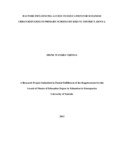| dc.description.abstract | The purpose of this study was to investigate the factors influencing access to education to
Sudanese urban refugees in primary schools in Kikuyu district. The study was guided by
the following objectives; to determine if the attitude of fellow students and teachers
influence on enrolment, to assess the availability of facilities, equipments and materials in
enhancing access to education, to examine the extent to which the language of instruction
influences access, to determine the relationship between parents/guardian level of
education and access, to establish if the economic status of a family influence access and
to identify if the Kenya policies to primary education have influence to access.
The research used the ex-post facto design. Three hundred and thirty five pupils were
sampled from twelve schools, four teachers from every school were used and ten head
teachers. Questionnaires and interviews were used to collect of data. The questionnaires
were piloted in two schools. The questionnaires were pre-tested using the test retest. Data
was edited, coded and analyzed using Statistical Package for Social Science (SPSS) using
descriptive statistics.
The research was based on the rights based approach to education in emergencies. The
proponent of this approach is the UN Convention on the Rights of the Child.
The results of the data analyzed showed that there was a significant relationship between
the learning environment and access of education to the Sudanese urban refugee pupils.
Language of instruction, being English and Kiswahili was evident that a majority had a
problem with which hindered access. Parental level of education and economic status of
the parent/ guardian was also indicated as a factor influencing access, where a majority of
the refugee parents have only the non formal education and do not have source of
income. Psychosocial factors were also evident as a factor hindering access.
The researcher recommended that the ministry of special programmes should educate
urban refugees on their rights and UNHCR policies and procedures on working with
them. The school should also have guidance and counseling and free English and
Kiswahili language remedial program.
The researcher recommended that further studies should be carried out on the factors
hindering access to education to Sudanese urban refugees but within the context of
secondary. The same study should be conducted in other urban refugee communities in
other regions for comparative purposes | en_US |



